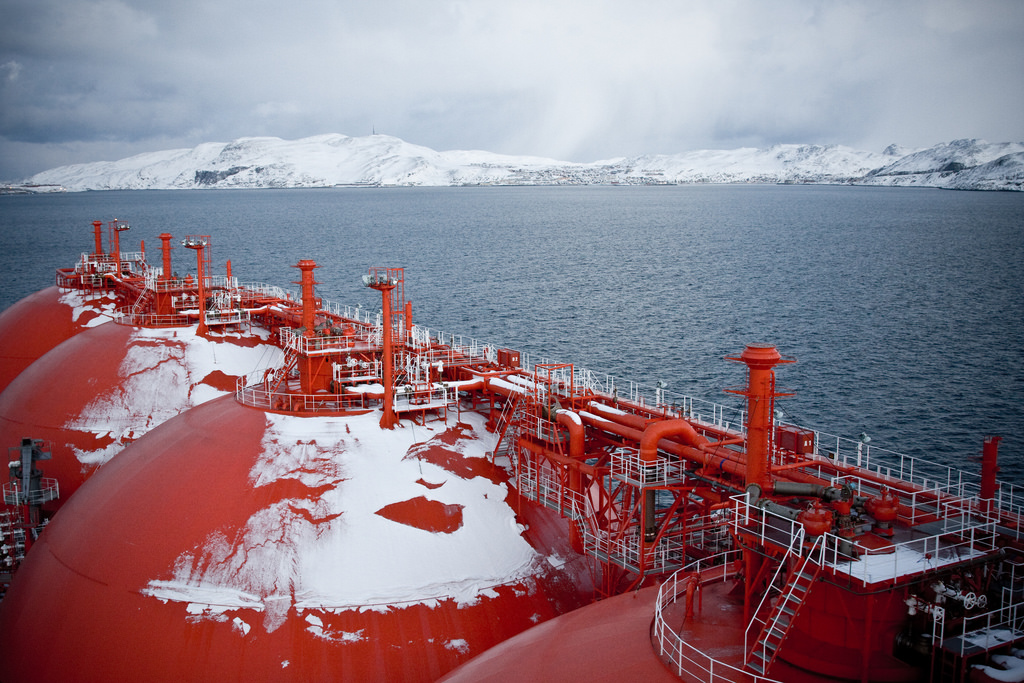Green groups are suing the Norwegian government to block oil drilling in the Arctic, on climate change grounds.
Greenpeace and Norwegian Young Friends of the Earth launched the case with a live webcast on Tuesday.
They will argue that licenses to drill in the northern Barents Sea violate the Norwegian constitution, the Paris climate deal and the rights of young people.
“It is a lawsuit about oil, the Arctic and our common climate,” said lawyer Cathrine Hambro. “In the lawsuit, we claim that oil licenses for drilling in the Barents Sea that have recently been awarded are illegal.”
The case hinges on article 112 of the Norwegian constitution, which was recently amended to guarantee citizens the right to a healthy environment.
It states: “Every person has the right to an environment that is conducive to health and to a natural environment whose productivity and diversity are maintained.
“Natural resources shall be managed on the basis of comprehensive long-term considerations which will safeguard this right for future generations as well.”
This will be the first time that provision is tested in the courtroom, Hambro said.
Norway has ratified the Paris Agreement, which aims to hold global temperature rise “well below 2C” from pre-industrial levels and aim for 1.5C. Since the deal was struck last December, Norway set a new target to go carbon neutral by 2030.
Yet there has been no move to rein in oil and gas production, which accounts for more than a fifth of the country’s GDP. Indeed, the petroleum directorate has issued further exploration licenses for the Barents Sea, off Norway’s northern coast.
Report: Norway awards new Arctic oil licences days after drilling pledge
The Paris deal does not explicitly limit fossil fuel production, but burning coal, oil and gas is the biggest driver of global warming. Various analysts have shown a significant proportion will have to stay in the ground to meet the Paris goals. Most recently, a report by Oil Change International found that mines and rigs already operating will blow the 2C carbon budget, if fully exploited.
Truls Gulowsen, director of Greenpeace Norway, called the government “mindless and irresponsible” for continuing to permit oil drilling. The case will seek to prove it is also unlawful.
Ingrid Skjoldvaer of Young FoE set out why the youth environmental movement was backing the lawsuit.
“Climate change really is dangerous, it is unfair and it is already happening,” she said, through a simultaneous translator. “I am speaking here on behalf of all the young people around the world and whose children’s children will be affected by climate change.”
Campaigners were flanked by US scientist James Hansen and philosopher and author Jostein Gaarder as they announced the case.
Hansen is the lead author on a paper undergoing open peer review, which argues continued high greenhouse gas emissions place a burden on the younger generation. If stronger carbon-cutting measures are not taken, it calculates meeting the Paris goals by removing carbon dioxide from the air will cost US$104-570 trillion dollars this century.
He is also the star witness for a youth climate lawsuit in the US, in which his granddaughter Sophie Kivlehan is a co-plaintiff.
Gaarder, best known for his novel Sophie’s World, addressed the ethics of the case. “A basis for all ethics shall be the golden rule of reciprocity,” he said, applying it between the generations. “You shall do to the next generation what you wish the previous generation had done to you…
“We have no right to hand over a planet earth that is in a more miserable condition than is the one we have had the good fortune to live on.”
Among those who agree that the Paris deal demands limits on fossil fuel exploration, there is debate over who has the right to extract. Some say only the most economic reserves should be used during the transition to a cleaner energy system. Others want more leeway for developing countries.
Arctic drilling is generally seen as risky, frontier territory, with harsh operating conditions pushing costs up. Shell abandoned its plans off Alaska amid campaigner pressure and low oil prices, having spent US$7 billion.
Statoil, Norway’s largely state-owned oil company, claims it can operate in a carbon-efficient and cost-competitive way in the Barents Sea.
Weekly briefing: Sign up for your essential climate politics update
